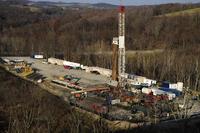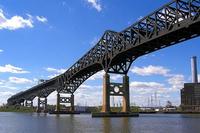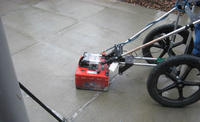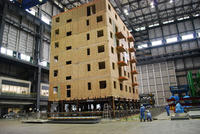-
Increased U.S earthquakes may be caused by fracking

From 1970 to 2000 the number of magnitude 3.0 or greater temblors in the U.S. mid-continent averaged twenty-one annually; by 2011 the number of such quakes had increased to 134; a new study by the U.S. Geological Survey links the increase of seismic activity to the increase in the use of hydraulic fracturing, or fracking
-
-
U.S. aging bridges in critical condition

There are an estimated 18,000 bridges in the United States that are classed as fracture-critical bridges, requiring continual inspections; the need for increased inspection and maintenance runs against shrinking state and federal budgets for infrastructure improvements; bridges must also be closed for maintenance – but at least for that there is now a solution: instant bridges
-
-
Wind power most cost-effective among renewables
Many developing countries should turn to wind power plants because of the lower costs, researchers have concluded in a new study on the use of climate protection funding from the north
-
-
Honda to reuse rare Earth metals from used parts

Rare Earth elements are essential to advanced technological application and to green technology products; China controls 97 percent of the world’s production of these elements, and has been using its near-monopoly to hobble non-Chinese companies and for political blackmail; in response, two Japanese companies announce a new process allowing them to extract as much as 80 percent or more of rare Earth metals contained in used nickel-metal hydride batteries
-
-
Himalayan glaciers decline less rapidly than previously feared
Several hundreds of millions of people in Southeast Asia depend, to varying degrees, on the freshwater reservoirs of the Himalayan glaciers; it is thus important to detect the potential impact of climate changes on the Himalayan glaciers at an early stage; together with international researchers, glaciologists from the University of Zurich now show that the glaciers in the Himalayas are declining less rapidly than was previously thought; the scientists, however, see major hazard potential from outbursts of glacial lakes
-
-
Bridges get a quick check-up with new imaging technique

EPFL engineers have developed a new imaging technique which allows engineers to see the insides of massive concrete bridges; much like a sonogram, this technique provides quick, easy-to-interpret images, so that the health of these expensive structures can be assessed and monitored
-
-
California quake test shows promise of new building code

Researchers place a model hospital on a shake table to assess the structure’s ability to withstand earthquake; in accordance with California latest building code, base isolators, which are rubber bearings intended to absorb the shock of the motion, were installed underneath the structure; the hospital passed the 6.7-magnitude and 8.8-magnitude tests with flying colors
-
-
Direct drinking water recycling could prevent floods
The use of a more streamlined process to recycle wastewater could have saved Brisbane from severe flooding in 2011 and mitigated recent flood risks in NSW, a leading water expert says
-
-
Water vulnerability in U.S. border region
The Arizona-Sonora region has been called the front line of ongoing climate change, with global climate models projecting severe precipitation decreases and temperature increases coupled with vulnerability from urbanization, industrialization and agricultural intensification
-
-
Westinghouse AP1000 reactor concludes qualification testing
Westinghouse AP1000 nuclear reactor’s design differs from earlier reactor design in that it employs passive safety systems which rely only on natural forces such as gravity safely to shutdown and remain cool; Westinghouse says it has successfully completed the design, manufacture, and qualification of the lead AP1000 Reactor Coolant Pump
-
-
£5 million investment in U.K. rail technology, business innovation
The U.K. government is leading on an investment of £5 million to accelerate business innovation and growth in the U.K. rail industry, using the funds to support the development of technologies to address technological and business challenges
-
-
Simulations helps overcome design challenges
Simulation software can pull volumes of complex data beyond simple measurements (think comparative load or stress tolerances) and layer that information into images; simulation can show how a bridge will perform based on how it is used, the conditions around it, its design, materials, and even variables such as the position of a joint — before a single component is manufactured or ground is broken
-
-
Southern sea levels rise dramatically
Sea levels have risen about twenty centimeters in the South West Pacific since the late nineteenth century, a new scientific study shows
-
-
Most states in U.S. unprepared for growing water threats to economy, health
Only nine states in the United States have taken comprehensive steps to address their vulnerabilities to the water-related consequences of changes in climate — rainfall events which increase flooding risks to property and health change, and drought conditions which threaten supply for municipalities, agriculture, and industries — while twenty-nine states are unprepared for growing water threats to their economies and public health
-
-
Small modular nuclear reactor may come to South Carolina
The U.S. Department of Energy’s (DOE) recently announced federal award totaling up to $452 million to support engineering, design certification, and licensing for up to two first-of-its kind small modular nuclear reactor (SMR) designs; a South Carolina-based organization dedicated to promoting innovative nuclear power generation wants to bring one such SMR to the state
-
More headlines
The long view
Water Wars: A Historic Agreement Between Mexico and US Is Ramping Up Border Tension
As climate change drives rising temperatures and changes in rainfall, Mexico and the US are in the middle of a conflict over water, putting an additional strain on their relationship. Partly due to constant droughts, Mexico has struggled to maintain its water deliveries for much of the last 25 years, deliveries to which it is obligated by a 1944 water-sharing agreement between the two countries.
Trump Is Fast-Tracking New Coal Mines — Even When They Don’t Make Economic Sense
In Appalachian Tennessee, mines shut down and couldn’t pay their debts. Now a new one is opening under the guise of an “energy emergency.”
Smaller Nuclear Reactors Spark Renewed Interest in a Once-Shunned Energy Source
In the past two years, half the states have taken action to promote nuclear power, from creating nuclear task forces to integrating nuclear into long-term energy plans.
Keeping the Lights on with Nuclear Waste: Radiochemistry Transforms Nuclear Waste into Strategic Materials
How UNLV radiochemistry is pioneering the future of energy in the Southwest by salvaging strategic materials from nuclear dumps –and making it safe.
Model Predicts Long-Term Effects of Nuclear Waste on Underground Disposal Systems
The simulations matched results from an underground lab experiment in Switzerland, suggesting modeling could be used to validate the safety of nuclear disposal sites.
